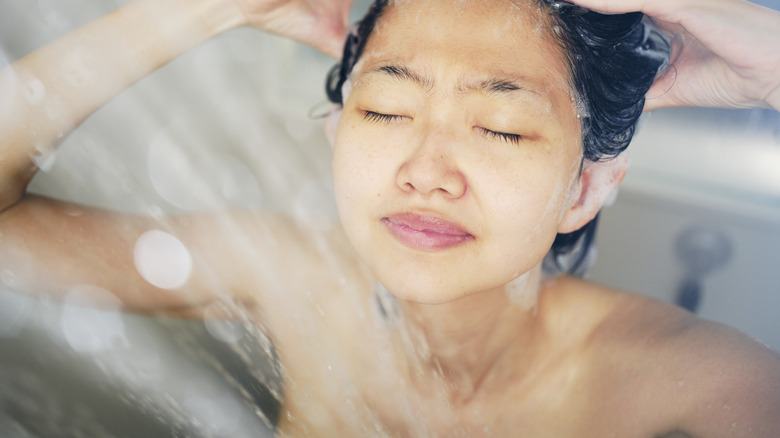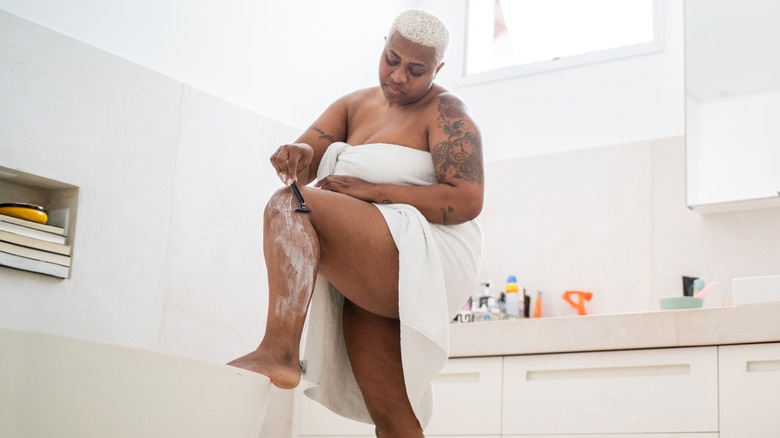Don't Let These Vaginal Hygiene Myths Disrupt Your Life (Or Your pH)
Whether it's cleanliness, smell, or appearance, there are a million ways that people with vaginas are made to feel embarrassed by their own anatomy, with vaginal hygiene myths at the root of most of them. Despite medical professionals proclaiming that the vagina is like a "self-cleaning oven," companies still insist on products marketed as vaginal hygiene tools. Everywhere you look there seem to be tips, trends, and advice that all inevitably recommend one of these products, which unfortunately often leads to new trends and fads in vaginal hygiene (cue the vagina glitter) that aren't always what they're cracked up to be, ultimately leaving you with uncomfortable results.
The biggest concern with these vaginal hygiene myths and the products designed to treat them is the potential for infection, physical damage like cuts and scrapes, and even the possibility of being more likely to catch an infection. These products can have dangerous repercussions, so let's break down some common myths about vaginal health.
You need to clean your vagina
Gynecologist at Gwinnett OB/GYN Associates Traci Johnson told WebMD, "The vagina has a very delicate pH balance that it deals with on its own and so you want to be hesitant to put anything in the vagina that may wash away the good bacteria and therefore let bad bacteria grow." In case you didn't already know, the vagina is acidic — that's a good thing. Your body's estrogen helps to create and keep an acidic vaginal mucus lining that protects the vagina from harmful outside microorganisms. This lining encourages the growth of your own lactobacilli bacteria while ensuring that other bacteria are kept in check. This acidity and bacteria are what make up your vaginal pH balance.
Products like douches, scented sprays, and steams are marketed as ensuring cleanliness, but can wreak havoc on your body's natural pH balance and even lead to bacterial infections and/or topical skin irritation. Even worse, since douches are considered cosmetic products, they are not required to be tested for damaging ingredients like antiseptics and hazardous chemicals by the U.S. Food and Drug Administration.
With that being said, it's important to remember that while your vagina absolutely does not need to be cleaned, your vulva does. The vulva includes the external portions of your genitalia, including your labia. Doctors recommend sticking to natural, unscented soaps to prevent any skin irritation in this sensitive area.
If you smell, you must be dirty
Vaginas should smell, and not just one specific way. Your vaginal pH balance shifts throughout your menstrual cycle, meaning changes to your vaginal odor throughout the month are normal. The Cleveland Clinic explains some common smells you might experience during the course of your cycle including sour, yeasty, sweet, metallic, ammonia, and skunk-like. Each of these smells tells you something different about your current vaginal pH balance, and all of them are completely normal. From sex and menstruation to pregnancy, different vaginal odors are a natural part of your body and are nothing to be ashamed of.
However, quite a few vaginal hygiene products target the idea that vaginal odor is inherently bad and/or something to be corrected. Products like fragrance sprays, vaginal deodorants, and powders are all sold as ways to rid people of natural vaginal odor, but some of these products can actually be incredibly dangerous. For instance, in 2018, 22 women sued Johnson & Johnson for the asbestos found in their baby talc, and these women claimed the product caused their ovarian cancer, resulting in the court ruling in their favor.
While certain odors are normal, be mindful of unpleasant and unusual odors (like stinky fish) that could be caused by imbalances in your vaginal bacteria levels. These imbalances can lead to vaginitis which can also be marked by vaginal inflammation and infection. Make sure to speak to your doctor if you're concerned about any unusual vaginal odors.
Your underwear affects your vagina
While that lace and satin cheeky might be calling your name, it can also cause a yeast infection. Synthetic fibers are less breathable which leads to trapped moisture which can, in turn, lead to an increased risk of infections like urinary tract infections and yeast infections. These infections, while treatable, can cause discomfort, pain, and having to avoid sex for a while. Most doctors agree that breathable cotton underwear is the best option to help prevent potential infections.
Similarly, tight-fitting clothing that restricts breathability can also have a negative impact on your vaginal pH. This is particularly true of clothing items that get wet or damp. Swimsuits and workout wear made of synthetic fabrics can contribute to an increase in vaginal discomfort if you keep this damp clothing on for extended periods of time. Remember, it's important to take off any wet or damp clothing as soon as possible to avoid any irritation or infection.
Waxing/shaving means you're cleaner
While some might not want to hear this, gynecologists recommend that the healthiest pubic hairstyle is an all-natural hairstyle. Donnica Moore, a gynecologist and president of Sapphire Women's Health Group, told Health, "Your pubic hair is there to protect the skin around your lady parts because that skin is very sensitive." Despite this, almost 60% of vulva owners report shaving or waxing because they believe it is more "hygienic".
Not only does this belief lack scientific support, but shaving and waxing can actually lead to other issues. In one survey, while over 75% of respondents reported grooming their pubic hair, more than a quarter of those also reported they had injured themselves while doing so. Grooming can inevitably lead to its own risks such as cuts, burns, and rashes. Vulva owners were also more likely to experience grooming-related injuries than penis owners. These cuts and injuries to your genital area can put you at a higher risk of contracting a sexually transmitted infection.
Vaginal discharge is bad
Your vagina first begins producing discharge during puberty. Discharge is mostly comprised of water and dead skin cells from your vaginal lining (also known as microorganisms), and the process is both completely normal and actually, a way for your vagina to keep itself clean. Throughout your menstrual cycle, you might notice changes in your discharge both in amount and consistency, which is also completely normal. Most people experience discharge on a daily basis. Wipes and cleansers marketed to combat this can lead to further issues like irritation and, frankly, aren't necessary. If you're someone with heavier daily discharge, consider natural pantyliners to help keep you dry.
While regular discharge can be normal, chunky or odorous discharge should absolutely be cause for alarm. Changes to your normal discharge can be a sign of yeast infections or other forms of vaginitis. Only you can know what constitutes normal discharge for your body, so always consult with your doctor if you suspect a possible vaginal infection.





